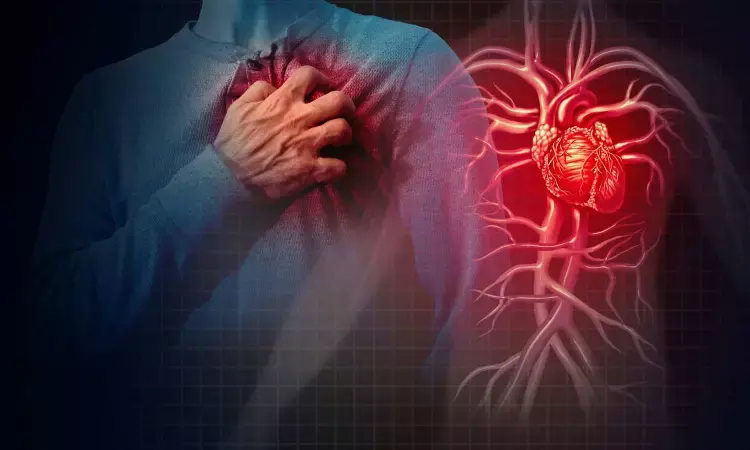- Home
- Medical news & Guidelines
- Anesthesiology
- Cardiology and CTVS
- Critical Care
- Dentistry
- Dermatology
- Diabetes and Endocrinology
- ENT
- Gastroenterology
- Medicine
- Nephrology
- Neurology
- Obstretics-Gynaecology
- Oncology
- Ophthalmology
- Orthopaedics
- Pediatrics-Neonatology
- Psychiatry
- Pulmonology
- Radiology
- Surgery
- Urology
- Laboratory Medicine
- Diet
- Nursing
- Paramedical
- Physiotherapy
- Health news
- Fact Check
- Bone Health Fact Check
- Brain Health Fact Check
- Cancer Related Fact Check
- Child Care Fact Check
- Dental and oral health fact check
- Diabetes and metabolic health fact check
- Diet and Nutrition Fact Check
- Eye and ENT Care Fact Check
- Fitness fact check
- Gut health fact check
- Heart health fact check
- Kidney health fact check
- Medical education fact check
- Men's health fact check
- Respiratory fact check
- Skin and hair care fact check
- Vaccine and Immunization fact check
- Women's health fact check
- AYUSH
- State News
- Andaman and Nicobar Islands
- Andhra Pradesh
- Arunachal Pradesh
- Assam
- Bihar
- Chandigarh
- Chattisgarh
- Dadra and Nagar Haveli
- Daman and Diu
- Delhi
- Goa
- Gujarat
- Haryana
- Himachal Pradesh
- Jammu & Kashmir
- Jharkhand
- Karnataka
- Kerala
- Ladakh
- Lakshadweep
- Madhya Pradesh
- Maharashtra
- Manipur
- Meghalaya
- Mizoram
- Nagaland
- Odisha
- Puducherry
- Punjab
- Rajasthan
- Sikkim
- Tamil Nadu
- Telangana
- Tripura
- Uttar Pradesh
- Uttrakhand
- West Bengal
- Medical Education
- Industry
Serious heart attacks more common on Monday

Serious heart attacks are more likely to happen at the start of the working week than at any other time, according to new research presented today at the British Cardiovascular Society (BCS) conference in Manchester.
Doctors at the Belfast Health and Social Care Trust and the Royal College of Surgeons in Ireland analysed data of 10,528 patients across the island of Ireland (7,112 in the Republic of Ireland, 3,416 in Northern Ireland) admitted to hospital between 2013 and 2018 with the most serious type of heart attack. This is known as an ST-segment elevation myocardial infarction (STEMI) and occurs when a major coronary artery is completely blocked.
The researchers found a spike in rates of STEMI heart attacks at the start of the working week, with rates highest on a Monday. There were also higher rates of STEMI than expected on a Sunday.
Scientists have so far been unable to fully explain why this “Blue Monday” phenomenon occurs. Previous studies suggesting that heart attacks are more likely on a Monday have highlighted an association with circadian rhythm – the body’s sleep or wake cycle.
There are over 30,000 hospital admissions due to STEMI each year in the UK. It requires emergency assessment and treatment to minimise damage to the heart, and this is normally performed with emergency angioplasty – a procedure to re-open the blocked coronary artery.
Cardiologist Dr Jack Laffan, who led the research at the Belfast Health and Social Care Trust, said: “We’ve found a strong statistical correlation between the start of the working week and the incidence of STEMI. This has been described before but remains a curiosity. The cause is likely multifactorial, however, based on what we know from previous studies, it is reasonable to presume a circadian element.”
Professor Sir Nilesh Samani, Medical Director at the British Heart Foundation (BHF), said: “Someone is admitted to hospital due to a life-threatening heart attack every five minutes in the UK, so it’s vital that research continues to shed light on how and why heart attacks happen.
“This study adds to evidence around the timing of particularly serious heart attacks, but we now need to unpick what it is about certain days of the week that makes them more likely. Doing so could help doctors better understand this deadly condition so we can save more lives in future.”
Dr Kamal Kant Kohli-MBBS, DTCD- a chest specialist with more than 30 years of practice and a flair for writing clinical articles, Dr Kamal Kant Kohli joined Medical Dialogues as a Chief Editor of Medical News. Besides writing articles, as an editor, he proofreads and verifies all the medical content published on Medical Dialogues including those coming from journals, studies,medical conferences,guidelines etc. Email: drkohli@medicaldialogues.in. Contact no. 011-43720751


